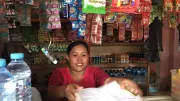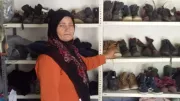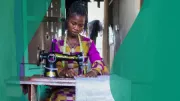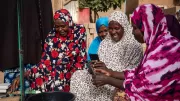Recent Blogs
Blog
Fintech in the Arab World: Toward Gender Parity in 15, Not 150, Years
Gender-intelligent fintech solutions are hard to come by in the region with the world’s largest financial inclusion gender gap. But some fintechs are pointing the way.Blog
COVID-19: A Trigger to Enhance Rural Agent Networks
COVID-19 has highlighted the importance of rural agent networks in reaching people with badly needed assistance. But the crisis has also exposed agents' vulnerabilities.Blog
3 Ways to Elevate the Consumer Voice in Financial Regulation
When consumers have a say in the financial regulations that affect them, it usually makes regulations more impactful. Here are three opportunities to ensure consumers' voices are heard.Blog
Opening Pandora’s Box: Revisiting the Impact of Small Business Finance
The debate over the impact of small business finance is far from settled. Here are four gaps in the evidence base that should be filled to move the debate forward.Blog
Debt Moratoria in the Next Pandemic: Be Prepared, and Be Fair
Moratoria have been an important part of the COVID-19 response for millions of low-income borrowers. Reflecting on the COVID-19 experience, here are four ways moratoria could work better in a future crisis.Blog
Women and Finance: Enabling Women’s Economic Empowerment
Reducing the gender gap requires that we put a gender lens on everything we do. CGAP CEO Greta Bull writes that without fully including women, we won’t solve financial inclusion or, for that matter, end extreme poverty and promote shared prosperity.Blog
What Drives the Financial Inclusion Gender Gap for Young Women?
Ahead of International Women's Day, CGAP and the Global Findex team analyzed how the account ownership gender gap varies across regions and age groups.Blog
Flipping the Switch: How Locking Assets Unlocks Credit for the Poor
A new study out of Uganda offers strong evidence that lock-out technology can enable providers to sustainably lend to low-income customers, who may need credit for school fees and other critical expenses.Blog
Can Free Phones Close the Digital Gender Divide?
Mobile phone affordability — the focus of most programs to distribute free phones to women — is far from the only barrier to women’s use of mobile phones.Blog
In Uganda, Solar Home Systems Help Students Stay in School
A pay-as-you-go (PAYGo) solar provider in Uganda is proving that an often-overlooked benefit of PAYGo – financial inclusion – can also affect education outcomes by keeping kids in the classroom.Blog
How Can Funders Promote Interoperable Payments?
Interoperability can make digital payments more convenient and useful for low-income customers. Find out how funders can support the development of interoperable payments systems.Blog
Preserving Decades of Development: A Plea for Lebanon
Nadine Chehade reflects on the toll the deepening economic and COVID-19 crises are taking on microfinance borrowers in her country, Lebanon, and what donors can do to help them overcome hardship.Blog
Beyond Access and Usage: Financial Services for Livelihoods
Not only have financial services have changed dramatically over the last 30 years, so have the ways people earn a living.Blog
Comparing India’s UPI and Brazil’s New Instant Payment System, PIX
Many countries are pressing forward with new systems to enable better, faster digital payments. Brazil's instant payment system, PIX, is among the newest and most exciting. How does it compare to India's well-known UPI system?Blog
Measuring Women’s Economic Empowerment in Financial Inclusion
Get answers to common questions about how to measure the impact of financial inclusion initiatives on women's economic empowerment.Blog
Let Her Choose: Supercharging G2P for Women
Government-to-person (G2P) programs can reach millions of women. What if instead of requiring women to receive payments from a single provider, they enabled women to select among several options and to reward good service with their business?Blog
Is Mexico’s “Fintech Law” Leading a New Trend in Fintech Regulation?
Some regulators are looking to Mexico's so-called "fintech law" as an example of how to respond to the full range of fintech innovations in a single law. But this isn't what the Mexican law does, and there are good reasons for this.Blog
How Social Norms for Men Restrict Women’s Financial Inclusion
Addressing social norms that affect men’s role in society and influence their behavior is an important — but largely overlooked — aspect of advancing women’s financial inclusion.Blog
Finding Opportunity in “Interesting Times”
What did 2020 teach us about financial inclusion? Greta Bull reflects on what was, for most people, an especially difficult year and offers her perspective on the year ahead.Blog




















